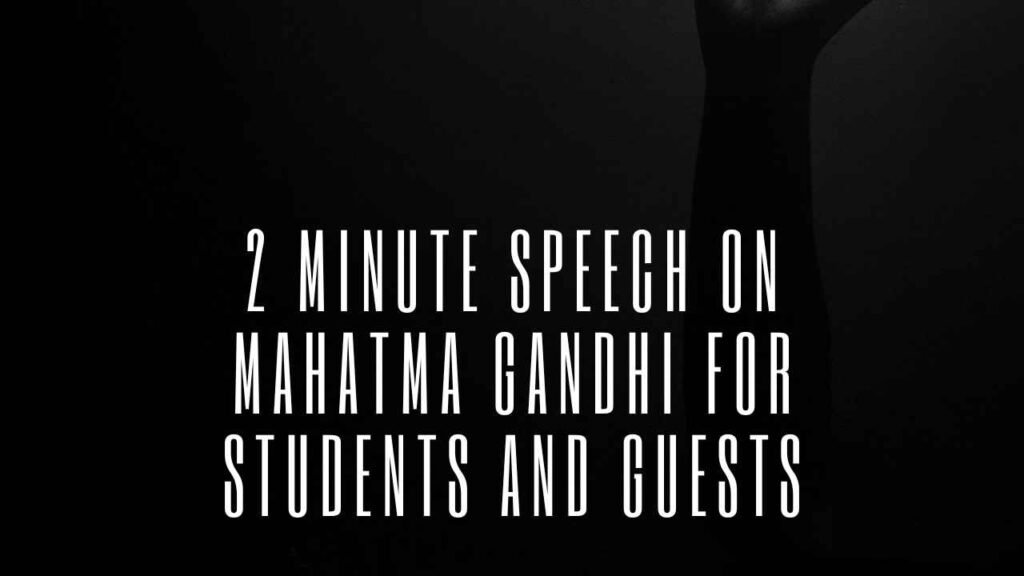
2 Minute Speech on Mahatma Gandhi for Students and Guests
Here, we are presenting 2 Minute Speech on Mahatma Gandhi for School and College Students and Speakers under word limits of 500 words. This topic is useful for students of classes 1, 2, 3, 4, 5, 6, 7, 8, 9, 10, 11, and 12 in English. These provided speech will help you to present yourself in front of any crowd gathering including your school seminar or any function.
2 Minute Speech on Mahatma Gandhi
Ladies and gentlemen, honored guests,
I am honored to speak to you today about Mahatma Gandhi, a man whose impact on the world continues to resonate. Gandhi was born in India in 1869 and spent his life advocating for nonviolence, justice, and equality.
Gandhi, affectionately known as the ‘Father of the Nation,’ was a key figure in India’s struggle for independence from British rule. What distinguished him was his view of ahimsa, or nonviolence, as a powerful tool for social and political change. His approach was simple but profound: fight injustice with love and understanding.
Gandhi’s life exemplified his beliefs. He led several campaigns, including the well-known Salt March, in which he walked more than 240 miles to protest the British salt monopoly. His commitment to peaceful resistance inspired movements around the world, including Martin Luther King Jr.’s American civil rights movement.
Beyond politics, Gandhi emphasized the value of self-discipline, simplicity, and community harmony. His words, “Be the change you want to see in the world,” reverberate across generations, inspiring us to take responsibility for effecting positive change.
In conclusion, Mahatma Gandhi’s legacy lives on as a symbol of hope, resilience, and the transformative power of nonviolence. Let us remember and be inspired by his life as we strive to create a more just and compassionate world for everyone. Thank you.
Second 2 Minute Speech on Mahatma Gandhi
Ladies and Gentlemen,
Thank you for hosting me today. It is an honor to speak about the great Mahatma Gandhi, whose influence on the world is immeasurable. Gandhi, born in 1869, was a leader and symbol of nonviolent resistance. He dedicated his life to achieving India’s independence and spreading the values of truth, nonviolence, and self-discipline.
Gandhi’s philosophy, known as Satyagraha, emphasized the importance of truth and love in the face of oppression. His famous Salt March in 1930, protesting British salt taxes, exemplifies his dedication to peaceful protest and civil disobedience.
Beyond his contribution to India’s freedom struggle, Gandhi’s teachings continue to inspire global movements for justice and equality. His belief in humanity’s inherent goodness and the transformative power of nonviolence is still relevant in the modern world.
As we reflect on Mahatma Gandhi’s legacy, let us strive to live out the principles of peace, tolerance, and justice in our own lives. His life is a timeless reminder that one person dedicated to truth and compassion can change the course of history.
Thank you.
Third 2 Minute Speech on Mahatma Gandhi
Ladies and gentlemen, honored guests,
I am truly honored to stand in front of you today to speak about Mahatma Gandhi, a remarkable individual whose life and teachings have left an indelible mark on the world.
Mahatma Gandhi, also known as Bapu, was a man of profound wisdom and simplicity. He was born in India in 1869 and has dedicated his life to the principles of truth, nonviolence, and peaceful resistance. His philosophy of “Satyagraha” encouraged people to fight for justice with courage and determination, relying on the power of truth to effect positive change.
Gandhi had a profound impact on India’s independence movement. Through peaceful protests, fasting, and civil disobedience, he inspired millions to join the fight for independence from British control. His famous Salt March of 1930, a 240-mile journey to the Arabian Sea, became a symbol of resistance to oppressive laws.
However, Gandhi’s influence extended far beyond India. His nonviolent approach to social and political change has inspired civil rights, freedom, and justice movements all over the world. His words, “Be the change that you wish to see in the world,” continue to ring true and inspire people to work for a better, more compassionate world.
In a complex world, Mahatma Gandhi’s message of simplicity, love, and nonviolence continues to serve as a beacon of light. Let us reflect on his legacy and strive to apply these principles in our daily lives, fostering a world of peace, justice, and understanding. Thank you.
Also Read: 2 Speech on Clean India Green India for Students and Guests